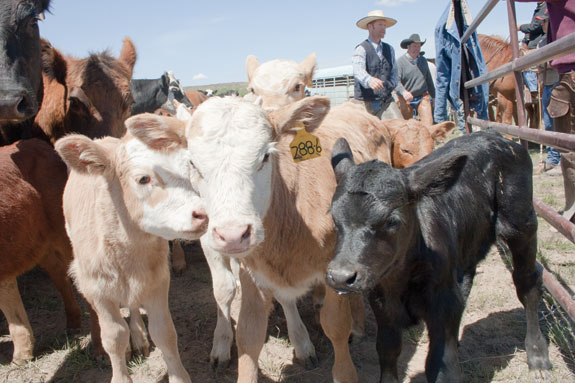The health and viability of a newborn calf immediately impacts your profit – the only profit opportunity you have from feeding a brood cow through the winter season.But, much as she’d like to, that cow can’t protect your profits all by herself.
Caring for the cow herd prior to calving, and at calving time, already involves a great deal of time, labor and expense.
There are few ways around this, and attention must be paid toward multiple aspects of the herd to get the new calf crop off to the right start.
With advanced technologies and research that helps us understand how best to use the technologies, there are actually ways that labor can be reduced while at the same time reducing health risk and increasing the protection a newborn calf has against life-threatening diseases.
Handling cows is stressful and labor-intensive
As every cattleman knows, the more times a cow is run through the chute, the more stressed she is and the more labor it takes.
With cows and heifers often being pregnancy checked and vaccinated at fall weaning time, running cows through for scours vaccinations four weeks prior to calving season is another chore.
Different types of scours vaccines are labeled for different times prior to calving. Use of this program requires careful planning and timing, and assumes you have a good idea when the cows are due to calve.
This is not always the case with bull-bred herds or late-season calvings from breeding with the bull turned out after an A.I. program.
Adrenaline is often released by cows due to the stress of being corralled and handled in response to stress. This natural hormone works against the immune system’s response to a vaccine.

Vaccinating for scours has pitfalls
Pre-calving vaccination programs are often recommended for scours prevention. While the science is sound, there are pitfalls in this approach that can leave calves at risk:
1. Scours vaccines require a healthy dam that has been fed at a proper nutrition level in the critical period leading up to calving.
While this is every cattleman’s goal, weather, feed conditions and age of the dam can cause considerable differences in their state of nutrition, even within the herd.
2. Calves are exposed to scour-causing bacteria almost immediately, even before they are strong enough to stand and nurse colostrum. By the time they receive maternal-derived antibodies, it can be too late.
3. Vaccination programs require precise timing for optimal results. This can be a challenge in herds where a broader breeding season is in play, or cattle are on pasture or range conditions ahead of calving season when vaccinations should be given.
4. Even with healthy, well-nourished cows, colostrum quality can be variable and compromised by circumstances of unexpected stress and health challenge immediately before or during calving.
Such situations will decrease the quality of the colostrum and limit the transmission of antibodies to the calves.
Newborn calf vaccines can help cut out the variability of some parts of this process. However, they still require proper ingestion of the vaccine by the calf, a colostrum delay to increase efficacy and an immune response to occur within the calf’s young and naive immune system.
Immune reactions may actually set the calf back
Based on current research, it appears that immune response in a calf can actually be detrimental to the early health of that calf, requiring energy that could better be used to fight off disease and gain weight.
Research conducted by Dr. Mark Cook at the University of Wisconsin shows that any immune system response is challenging to the animal.
And the response can actually be more harmful to the animal than no vaccination at all if the specific immunity is not needed.
Cook’s research shows that when an immune response is effectively achieved, muscle tissues demand more amino acids to create the immunity.
These are the same amino acids that could otherwise be used by the muscle tissue to grow and strengthen the calf’s overall health, rather than responding to the vaccination.
Cook believes it is important to find ways to limit immune response, and if your calves don’t need vaccination, you shouldn’t use it.
Avoid colostrum delay
Calves are born with relatively low body fat as compared to many other species, which further challenges their ability to protect themselves.
It is very important your newborn calves get nutrient-rich colostrum as soon as possible. Not only does this colostrum provide the valuable, additive advantage of maternal-derived antibodies, it is a critical energy source for newborn calves to meet immediate energy and growth needs.
Dr. Amelia Woolums at the University of Georgia also notes the important role of fat-soluble vitamins, such as A and E, present in high concentration in colostrum from healthy cows.
She notes calves that do not ingest an adequate volume of good-quality colostrum will begin life deficient of these vitamins, which will in turn make them even less likely to respond to vaccinations.
While some vaccination protocols require a delay in colostrum feeding, it is not recommended to delay this critical feeding – for any reason.
Calves do need protection from life-threatening organisms
There is no doubt, calves still need protection from life-threatening organisms – particularly those that commonly cause scours in young calves.
Within the first seconds of their life, calves will be threatened. E. coli and coronavirus are two of the most challenging pathogens for calves to fight off.
There also are alternatives to conventional vaccination protocols, which can boost calf health and protection from pathogens without the challenges discussed above.
For these options, colostrum delay is not necessary – and not recommended. These products deliver specific antibodies at the gut level to immediately protect against disease, while also providing additional immunoglobulins to be absorbed into the bloodstream for extended protection.
The instant protection against the pathogens does not require the stress of an immune reaction that can take both time and valuable energy to establish.
For best results, these forms of protection should be delivered to the calf as soon after birth as possible. Not only will this help expedite protection for the calf, but it should be the easiest time to handle the calf without interfering with the mothering instincts of the cow.
It is best to work closely with your veterinarian and animal health supplier to develop the best disease prevention program possible, before calving season is upon you.
While vaccination programs can help, remember the newborn calf is born vulnerable and needs immunity support as soon as possible. Put a program in place that delivers immediate protection for your calf, and you too reduce labor, risk and even cost.
PHOTO
RIGHT: Calves are born with relatively low body fat as compared to many other species, which further challenges their ability to protect themselves.
ABOVE: Take steps to make vaccinations less stressful on the calf, or else increased adrenaline may reduce the immunity of the calf. Photos by Philip Warren.







